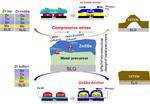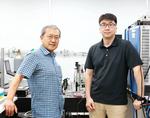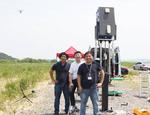Other
News DGIST presents a new technology that remarkably enhances the electrical conductivity of solar cells!

“A team led by Professor Jongmin Choi of the Department of Energy Science and Engineering has developed a “PbS quantum dot” that can rapidly enhance the electrical conductivity of solar cells. This was a joint research with Professor Changyong Lim …
News Water Pollution, a Major Environmental Contamination Issue, Solved by Developing Eco-friendly Materials Capable of Purifying Water at High Speed with Inexpensive Raw Materials!

“- DGIST Professor Park Chi-Young’s team developed photothermal porous polymer capable of ultra-fast adsorption and removal of phenolic microplastics and VOC contaminants in water - Showing the potential as a next-generation water purification material made of inexpensive raw materials, and ultra-high …

“A research team led by Professor Seo Dae-ha of the Department of Physics and Chemistry at DGIST (President Kuk Yang) developed an optical microscopy that can control and observe electron transfer and transfer in complex chemical reactions occurring in nano-catalysts …

“The DGIST (President Kuk Yang) Thin Film Solar Cell Research Center (Chairman Gang Jin-gyu) worked with Professor Kim Se-yoon of the Department of New Material Engineering at Kyungnam University (President Park Jae-gyu) to investigate the cause of pore formation, a …

“DGIST scientists have found a novel way to control magnetic spins in a localized space. Scientists in Korea have found a new way to control the alignment state of magnetic atoms in an antiferromagnetic material, showing promise for the development …

“Scientists devise a 2D-material–based stacked structure with applications in reducing computing power consumption Scientists have designed a 2D material-based multi-stacked structure comprising tungsten disulfide (WS2) layer sandwiched between hexagonal boron nitride (hBN) layers that displays long-range interaction between successive …

“Scientists in Korea explain a new process that maximizes photon conversion in 2D materials, which could innovate photonic-based applications Scientists at Daegu Gyeongbuk Institute of Science and Technology, Korea, have developed a new process that provides an ultrafast process of …
News A Technology to Transform 2D Planes into 3D Soft and Flexible Structures by Engineering Adhesion between Thin-Films

“- DGIST Professor Sohee Kim’s Team developed a technology to produce 3D soft and flexible devices by blowing balloons made of polymeric thin films. - Can be made in various 3D shapes… Expected to have diverse medical and biomedical applications. DGIST …

“A technology that can obtain high-resolution, micrometer-sized images for mass spectrometric analysis without sample preparation has been developed. DGIST Research Fellow Jae Young Kim and Chair-professor Dae Won Moon’s team succeeded in developing the precise analysis and micrometer-sized imaging …

“DGIST announced on Tuesday, July 16 that Senior Researcher Dae-gun Oh’s team in the Collaborative Robots Research Center developed a radar system that can detect subminiature drones that are 3km away. This research is expected to make huge contributions …

